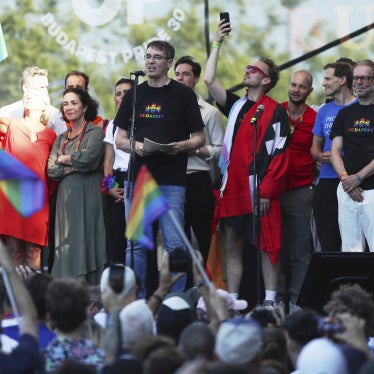Latvian authorities must uphold their obligations to respect and observe human rights law by overturning a ban on a lesbian and gay rights demonstration, Human Rights Watch said today.
“Riga’s lesbian and gay community wants to hold a gay pride parade in celebration of human rights for all, while the city council and administrative court are pushing discrimination,” said Jessica Stern, researcher in the Lesbian, Gay, Bisexual and Transgender Rights program at Human Rights Watch. “Moldova, Poland and Russia drew worldwide condemnation when they tried to ban pride marches. The Latvian authorities should learn from that and stand up for rights, not repression.”
On July 21, the Administrative Court of Latvia upheld the July 19 decision of the Riga City Council to deny an application by several lesbian, gay, bisexual and transgender (LGBT) organizations for “Riga Pride 2006”, scheduled to take place on July 22. Both the court and the city council justified their decisions with claims that the parade posed a serious threat to national security. Before the council’s decision, anti-pride activists demonstrated in front of the city council building and organized a petition in opposition to the parade. While the court’s decision will be partly explained on Monday July 24, much of the information has been classified as state secret. Information about this case will remain sealed from the public for the next five years.
Prior to the court decision, Latvian President Vaira Vike Freiberga and Prime Minister Aigars Kalvitis denounced the city council’s decision, stating that discrimination on any grounds, including sexual orientation, is unacceptable. Human Rights Watch commends their statements and urges them to change their condemnation into action that would allow the pride parade to go forward.
In 2005, the Riga City Council also denied a permit for a gay pride march that was to be the first in Latvian history. Andris Grinbergs, city council deputy executive director, recently explained that, “Last year, we banned the march because of moral values.” The 2005 decision was overturned by Latvia’s Administrative Court, which permitted the march to take place. Approximately 100 lesbians, gays and supporters gathered in the city center for the pride parade. During the march, several LGBT persons were subjected to physical and verbal abuse by crowds of counter-demonstrators.
Human Rights Watch said that governments should not obstruct fundamental rights to freedom of assembly, of expression and from discrimination, and that they have positive obligations to ensure that demonstrators are protected in a manner which ensures their ability to exercise these rights.
“Latvia is bound by international, European and domestic law to enforce these rights, but the Riga council and the court are flouting their obligations and enforcing discrimination,” Stern said.






